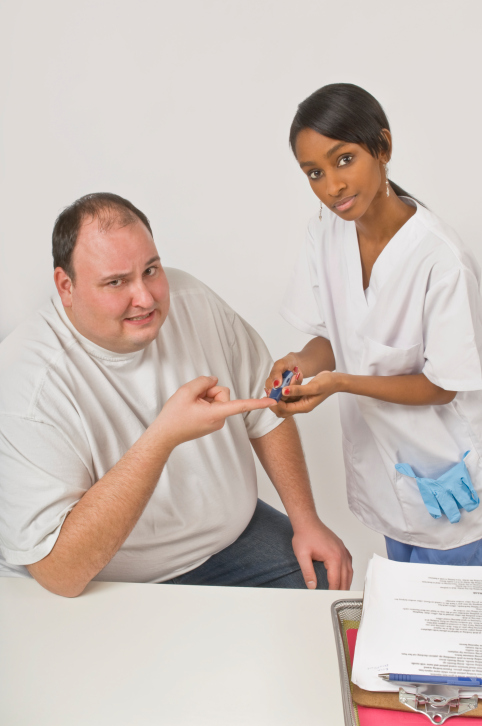Staying Healthy with Diabetes Includes A1C (HbA1c) Testing
Sure, you test your glucose level several times a day. You’re aware of diet and exercise issues and do your best to stay on track — staying healthy with diabetes. But what about your hemoglobin A1c level? What does it mean and why is it so important?
The hemoglobin A1c test is a simple lab test that shows the average amount of sugar in your blood over the last two to three months. It’s the best way to find out if your blood sugar is under control. All people with type 2 diabetes should have a hemoglobin A1c test at least twice a year. If your treatment changes or if your blood sugar level stays too high, you should get a hemoglobin A1c test at least every three months until your blood sugar level improves. Regular testing will help you and your doctor to track your blood sugar levels over time and plan long-term treatment options to reach your target level of control.
Red blood cells are continually dying and being replaced, so at any given time they have a range of ages in your body. In a sense, your blood tells the history of your glucose level over the last few months. For example, if your levels were not in control three weeks ago, glycated hemoglobin will persist in the blood cells that were active at that time. If your blood sugar tends to go up at night, when you are less likely to self-monitor, your HbA1c test will indicate a higher average level of blood sugar than you found through self-monitoring.
A good hemoglobin A1c reading for people with type 2 diabetes is less than 7%. You can do a lot to bring down a high blood sugar level and get it under control. Start by asking your healthcare provider for a hemoglobin A1c t est. If your hemoglobin A1c test result is too high, talk to your healthcare provider about how to lower it. Keep your goal in sight, but remember that lowering your hemoglobin A1c levels by any amount improves your chances of staying healthy.
Know Your A1c
Find out how much you know about the hemoglobin A1c test (also called A-1-c). Mark each statement true or false. Then see how you did by checking the correct answers and explanations on this page.
- An A1c test measures the average amount of glucose in your blood over the last 3 months. T F
- It’s important to know your A1c number. T F
- All people with diabetes need to have an A1c test. T F
- The A1c goal for people with diabetes is less than 7 percent. T F
- Most people can tell what their blood sugar levels are simply by how they feel. T F
- You can do something about high blood glucose. T F
- An A1c number over 8 percent is a sign that one or more parts of your treatment plan needs to be changed. T F
- There’s no proof that lowering your A1c number can reduce your chances of getting serious eye, kidney and nerve damage. T F
- True. The A1c test shows the average amount of glucose (sugar) in your blood over the last 3 months. The A1c is the best test to find out if your blood glucose is under control over a period of time.
- True. If you know your A1c number, you will have a sense of your diabetes control. A result above 8 percent is a sign that you should work with your health care provider to change your treatment plan. A 7 percent or lower result is a sign that your treatment plan is working, and your blood glucose is under control.
- True. All people with diabetes should have an A1c test at least twice a year and up to four times a year. If your blood glucose levels are too high or too low, work with your health care provider to reach your target level of control.
- True. The A1c goal for people with diabetes is under 7 percent. But, if you can lower your A1c number by any amount, you will improve your chances of staying healthy.
- False. Research shows that few people can tell their blood glucose levels simply by how they feel. Checking your blood glucose is the only way to know for sure whether you reach your blood glucose goals.
- True. You can do a lot to bring down high blood glucose levels and get them under control. Start by asking your health care provider for an A1c test. If your A1c test result is too high, talk to your health care provider about how to lower it. To get your blood glucose under control, follow the meal plan recommended by your health care provider, increase your physical activity, take your prescribed diabetes medicines and consult your health care provider often.
- True. A change in treatment is almost always needed if your A1c is higher than 8 percent. Common causes of high blood glucose include eating too much food or eating the wrong foods, lack of physical activity, stress, a need to incre ase and/or change medicines and infection or illness. If your A1c number is too high, work with your health care provider to change your treatment plan.
- False. Recent studies show that the lower the hemoglobin A1c number, the greater the chances that you will slow or prevent the development of serious heart, eye, kidney and nerve damage.
Q Is the A1C test important for everyone with diabetes?
A Whether you have type 1 or type 2 diabetes, the A1C test is a very important and meaningful test that determines your overall glucose control. A1C shows your average blood glucose for the two to three months prior to the test.
It also tells you your risk for long term problems from diabetes. Research has shown that the closer your hemoglobin A1C is to 7 percent or less, the less likely you are to develop problems, such as retinopathy (damage to the retinas in your eyes), nephropathy (kidney disease) and neuropathy (nerve damage).
Remember, A1C testing is not a replacement for regulary monitoring your blood glucose levels. It’s helpful to compare the A1C test result with your blood glucose monitoring results. Ask yourself if they make sense. If they don’t, you may need to check your blood glucose more often or at different times. Checking your blood glucose at different times can help you answer questions about why your A1C doesn’t match your blood glucose readings. If your A1C test result and your blood glucose values are higher or lower than your targets, discuss ways to make changes in your diabetes care with your health care providers.
The Importance of A1C Testing
Checking blood glucose daily is important. But don’t forget to check your A1Cs regularly, as well. The A1C (or hemoglobin A1C) test is a blood test that shows your average blood glucose results over the previous two to three months. It gives you the big picture of your blood glucose levels, including all of the ups and downs.
According to the American Diabetes Association (ADA), your A1C should be 7 percent or lower. If your A1C is higher, you and your health care provider may need to make changes in your diabetes care plan. Your provider may suggest changes to your medication regimen. You may also benefit from more education or a visit with a dietitian.
A1C TESTING—FROM OFFICE TO HOME
Since the invention of the A1C test about 20 years ago, it has been done only in a health care provider’s office or a lab, using a blood sample from the finger or arm. But now you can check your A1C yourself with an over-the-counter A1C test. These devices have been approved by the Food and Drug Administration (FDA).
HOW OFTEN TO TEST?
According to the ADA, you need to have your A1C checked when you first find out you have diabetes. After that, the ADA recommends getting an A1C test at least twice a year. Your A1C testing schedule may be different. For example, if you start a new diabetes medication or your blood glucose readings aren’t in your target range, your A1C needs to be checked every three months.
SHARE YOUR RESULTS
The A1C test does not replace daily glucose monitoring or visits with your health care provider. If you choose to use the at-home A1C tests, share your results with your health care provider, just as you would your daily blood glucose readings.






